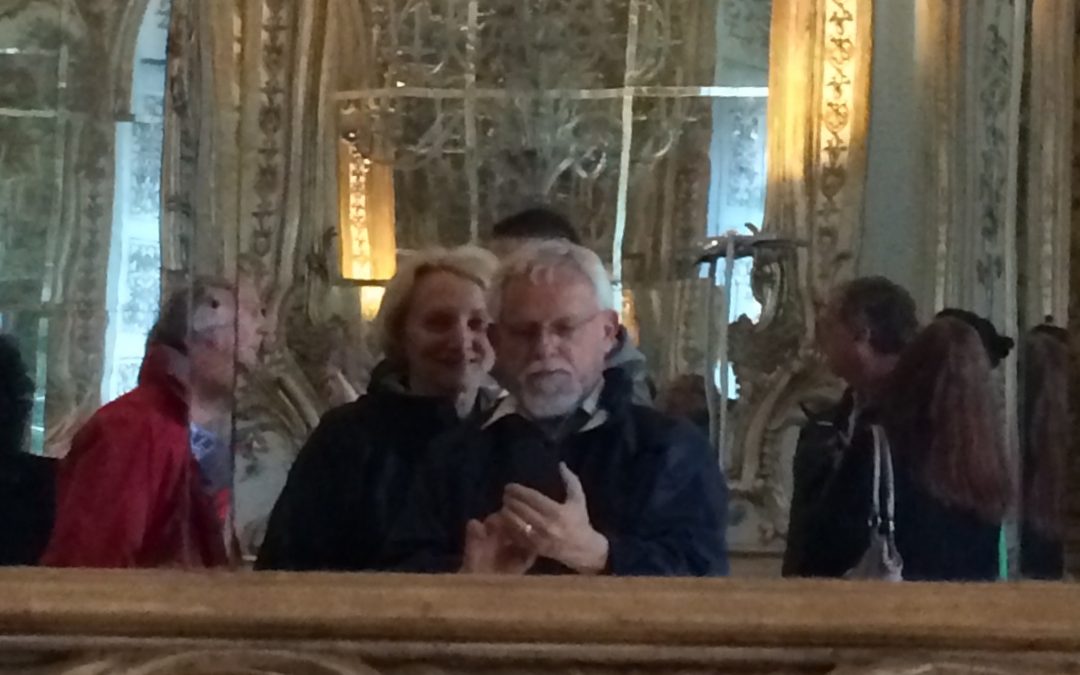–You know you’re traveling when your body clock keeps saying it’s time to sleep, it’s time to eat, and the times don’t correspond at all with where you are.
–You know you’re in a foreign country when you go to church and the priest’s reflection is incomprehensible except for the words Palestine, Syria, and Iraq.
–You know you’re in Europe when the hotels, no matter the country, provide French soaps.
–You know you’re in Munich when the bill for an appetizer, side dish and glass of wine for two is 100 euros.
–You know you’re not in Seattle when the bicyclists obey the traffic laws and don’t cross intersections if the light is red.
–You know you’re not in Seattle when it rains, and everyone pulls out an umbrella.
–You know you’re not in any American city when you and your husband can buy a Partner ticket (Partner is the word used in German) and travel all around the city easily. You might get a bit lost when the transfer bus the hotel clerk told you to take is out of service for repairs. Then a lovely German woman, who knows less English than you know German, will somehow figure out what you need and introduce you to the conductor on the next tram. He will then welcome you aboard, and deposit you a few stops later, back on the route you intended all along.
 |
| Entrance to our Hotel |
As we edged closer and closer to our trip to Germany and Austria, I kept looking at the map and wondering why I hadn’t included a quick jaunt to Italy in the itinerary. It is just a quick plane hop away. Unlike previous travels, I had spent little time learning a few basics of the language in the country we would visit. Of the few phrases I attempted to learn were, “I am allergic to dairy” and “Where is the bathroom?” I lamented that my Italian would not be useful just as I am becoming courageous enough to simply blurt out Italian and hope it works.
What a joy to arrive in Munich and have the hotel recommend an Italian restaurant nearby. And how comforting to visit La Stanza that evening and discover that everyone there spoke Italian. The food was excellent and I had decided we would return before we even left the restaurant.
It turns out that in Southern Germany, like in England, no one recommends the local cuisine. It is assumed that you will eat the food of other countries. We did have sausages, potato salad and kraut in a beer garden—how could we not? But, for our other meals we ate Italian, Japanese and attempted Indian, but the restaurant was too crowded to accommodate us.
 |
| I’m going to stuff my suitcase with German bread |
My favorite meal, at a restaurant near the Schloss-Nymphenburg: an appetizer platter with sausages and mustard, duck with fresh horseradish, a prosciutto-like meat, trout, pickles and (my favorite—where can I get some more?) apple-lard on nutty German bread.
We usually spend time in a city just wandering around and getting a feel for it but this time we only had a few days and played the tourist. We visited museums (with Italian paintings and scientific equipment) went to the Marienplatz to see the glockenspiel dance at noon; and visited the royal palace (an French/Italian wannabe).
The Schloss-Nymphenburg is promoted here as the most beautiful palace in the world (and it might have been—once!); it may be the most enormous palace anywhere, but now it is only a series of palazzos strung together like pearls on a necklace by long hallways of glass and portraits.
 Its most significant feature is the Hall of Beauties, thirty-six portraits of beautiful women secured and painted according to the specifications of the ruler. Gary wondered if this was his version of Playboy but I think not. With all the nude women painted on the walls and ceilings, these modest, standard portraits, are something more. I can’t put my finger on it, but I do wonder what his wife must have thought. Did she take another route through the palace so as not to confront the display?
Its most significant feature is the Hall of Beauties, thirty-six portraits of beautiful women secured and painted according to the specifications of the ruler. Gary wondered if this was his version of Playboy but I think not. With all the nude women painted on the walls and ceilings, these modest, standard portraits, are something more. I can’t put my finger on it, but I do wonder what his wife must have thought. Did she take another route through the palace so as not to confront the display? Quite by accident we went to the palace on the 350thanniversary of its creation. This meant that entrance was free, in exchange for listening to thirty minutes of speeches, and hearing some music. There were actors in Baroque costumes accompanied by medieval musicians. The hall in which the occasion was marked as been restored and future work is anticipated to restore the palace to its former glory.
The most amazing part of the palace is the stables where royal carriages and sleighs have been preserved and displayed. They were beyond description with their gold, and statues, and paintings, and furs, and feathers, and leather, and jewels. A picture will have to suffice, even though the picture cannot capture the splendor and size.
I asked Gary what he thought of Munich and he contributed the following (as well as five of the photos):
Munich is the capital of Bavaria, the southernmost state of Germany—predominantly Catholic, fairly conservative—but welcoming visitors from all over the world. The landscapes are green, the air is fresh and cool, and the cows are all contented.
 |
| Heiliggeistkirche Church with Paper Cranes |




